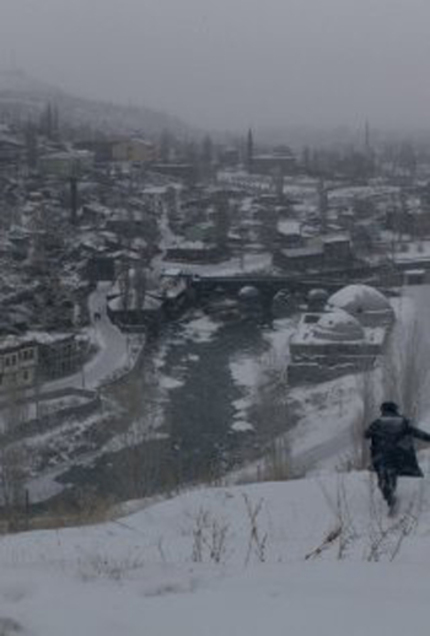SIFF 2011: KOSMOS (2011)

I can say that the film creates an almost oppressive mystical aura--but I think that was part of the point.
Kosmos is about portents, omens, and sinners in maybe a similar way that Michael Haneke's The White Ribbon was about the same. Except that film really became a series of incisive character studies in the face of slowly encroaching evil, while this one seems to hint at a hand of God affecting/afflicting the lives of its characters. I apologize, I try to avoid comparing the works of different directors in the same review, but I'm trying to give you a sense of what I saw.
The man at the center of the movie is the titular Kosmos (Sermet Yesil), who saves a drowning child from a river, thus ingratiating himself to a local village community, especially the boy's father, Yahya (Hakan Altuntas). Kosmos--we're not sure that's his name, but it's one of a couple that he gives--is almost an anti-charismatic. He talks in circles and frequently in sermons about divine justice with the overarching idea being that the sun shines down on the lowest dog just as it does on the greatest man. Kosmos seems to just alienate the villagers though who quickly find their patience wearing thin with this wild-eyed man, prone to fits of yelling and wild-eyed laughter.
Kosmos' arrival in the tiny village--where we're assured by the locals all the men are virtuous and pious--is marked by ongoing bombing maneuvers by the military, a violent debate about the opening of the borders to foreign workers, and a rash of break-ins at the local shops. The locals say none of these things happened before this stranger arrived. They don't exactly blame him, but they give him a wide berth.
I feel like I'd have a better grasp on the movie if I could parse any of the lengthy sermons delivered by Kosmos. But he's such an alien presence on the screen, his reactions so odd, off-putting, and inhuman, that his thoughts become impenetrable. The way Erdem films him, Kosmos is often reduced to a pair of bright white eyes under a shock of wild hair, looking more often than not unkempt and quite mad. I don't want to be in the same area code as this guy, much less listen to what he has to say.
But again, I suspect this was part of the director's intent. I think Kosmos is a holy man and Kosmos is a movie about a certain type of religious experience. As your reviewer, I apologize for not being able to either share or understand it.
Kosmos is screening as part of the 37th Seattle International Film Festival. You can find out more about the festival on its site.







